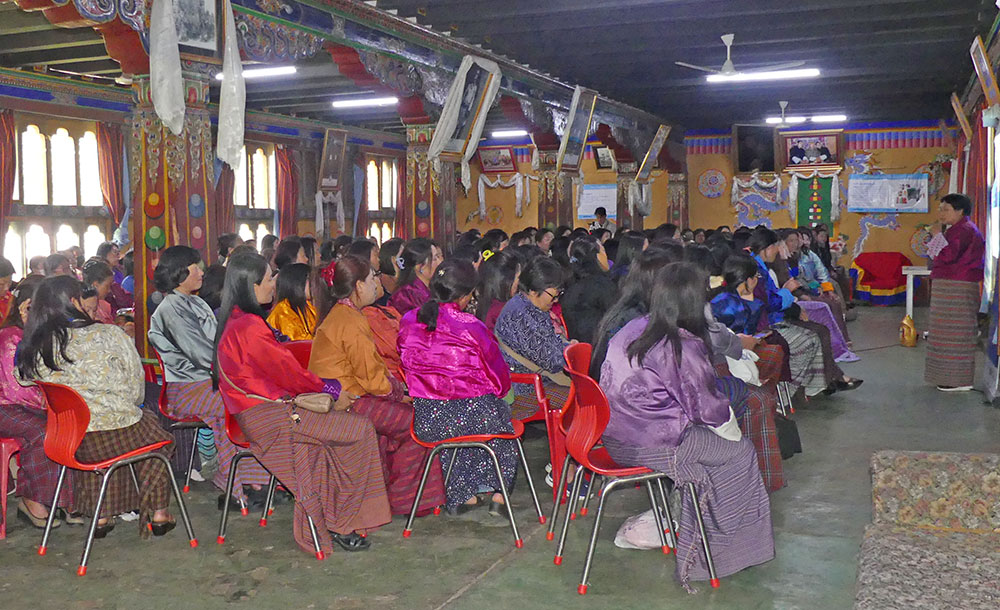
Among the 200 participants who participated in a day-long “Household Level Waste Management Advocacy”, on the premises of the Royal Body Guard (RBG) in Thimphu yesterday, 63-year-old Kuchum stood out conspicuously.
Kuchum, a waste advocate from Yusipang under Chang Gewog in Thimphu, collects waste and keeps her community clean.
Kuchum now collects plastic and bottle waste to supply to waste management agencies.
Yesterday’s waste management advocacy was the second such programme. The advocacy programme is a component of “Reimagining Effective Partnerships for Tackling Plastic Waste and River Pollution”, a project conceptualised by Gross International Nature (GIN), a youth-led organisation led by Bhutan Ecological Society (BES) in partnership with Clean Bhutan.
The participants were given both theoretical and practical experience of identification of seven types of plastics and its classification through the resin identification code. Of the seven types, four are recyclable.
At the event, Kuchum highlighted the increasing amount of waste. She attributes it to changing consumption patterns and increasing import of goods.
“From a religious perspective, polluting natural elements, which are considered sacred, is a sinful act,” she said. “From a health perspective, waste is a source of disease outbreaks.”
Kuchum emphasised that river pollution has severe implications for human health and aquatic life. She calls for stricter monitoring and hefty penalties for violators. She also advocates for waste segregation at the household level.
The founder of GIN, Tshering Lhamo, pointed out the severe impact of increasing plastic pollution in Thimphu on people, the environment, and government investments.
“Reflecting on the increasing waste over the years, it is time, if not already too late, for Bhutan to venture into innovative solutions instead of selling waste, which currently does not have a good market,” she said.
She said GIN has been working on this project for about four months. GIN plans to establish 20 filtration systems. Five have been completed. The team plans to establish a recycling hub to process recyclable materials to create useful products like bricks and pellets.
“The project aims to manage waste through household level advocacy, river clean-ups, waste collection, and using plastic waste as a raw material to produce new materials,” she said, adding that their effort complements the thromde’s and government’s initiatives to reduce waste before reaching landfills.
According to an official from the UN Office for Project Services, the project aims to change the behaviour of the public and school-going students so that they adopt the concept of reuse, recycling, and refusing plastic.
A survey conducted in Thimphu Thromde and Kawang Gewog revealed that 75.51 percent of women work in the household sector. The project aims to engage more than 1,500 beneficiaries, committed to ensuring that at least 50 percent of participants come from marginalised sectors of society, including youth and women.
The project focuses on eight communities of Taba, Jungshina, RBG colony, Dechencholing Higher Secondary School, Kawang Gewog, Kuzhugchen Middle Secondary School, Tango, Dordena Buddhist College, and Pangrizampa.
One aspect of the project is setting up a recycling hub equipped with advanced technologies to process different types of plastic waste, such as high-density polyethylene, polypropylene, and polyethylene terephthalate, into eco-friendly bricks (UR bricks) and reusable PET pellets at Bjimena Industrial Hub.
GIN has been assisted by Precious Plastics (Netherlands), Tashi Beverages and Clean Bhutan for recycling hub.
The project has the potential to prevent approximately 422 tonnes of plastic waste from going to landfills. This is expected to help eliminate around 1,266 tonnes of CO2 emissions annually.
The project is scheduled to conclude in January 2025. It is implemented under the Plastic Free Rivers and Seas for South Asia grant, a project worth USD 1.04 million funded by the World Bank and implemented in collaboration with the South Asia Co-operative Environment Programme and support from UNOPS and other local bodies.












